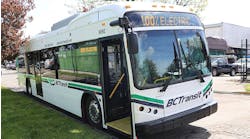REM station at Trudeau Airport receives C$500 million in federal and provincial financing
A series of grants and loans provided by the government of Canada and province of Quebec will provide a total of C$500 million (US$398.5 million) to construct the planned Réseau express métropolitain (REM) station at the Montréal-Trudeau International Airport.
The planned REM network will nearly double Montréal’s metro network at full build out of its 67 km (41.6 miles) with 26 stations. The light-rail system will be automated with the Trudeau Airport station planned opening in 2024.
“Montréal, just like any other big city, should have its own intermodal mass transit network. This station and the rest of the REM roll-out clearly represents the strong links of public transportation system in the greater Montréal region. This is why we believe that a direct access to the passenger terminal through the REM, and therefore the construction of this station, is crucial,” said Quebec Minister for Transport and Minister responsible for the Metropolis and the Montréal Region Chantal Rouleau.
The station is estimated to cost approximately C$600 million (US$478.19 million) and will be financed through private and public capital. Transport Canada will contribute C$100 million (US$79.7 million) as part of its commitment outlined in the Fall Economic Statement 2020 to help large airports by investing C$500 million (US$398.5 million) over six years to support airports through safety, security and transit infrastructure investments.
“As Canada looks ahead to economic recovery, transportation and tourism will be vital while we build back better. Our government clearly stated its commitment to ensuring that critical infrastructure projects at Canadian airports was a priority. The funding announced today will ensure that Montrealers and all Canadians benefit from an efficient and green connectivity to the Montréal-Trudeau International Airport,” said Canada Minister of Transport Omar Alghabra.
In addition to the federal financing, Aéroports de Montréal will be provided with a C$100-million (US$79.7 million) loan by the government of Québec through Investissement Québec. A second loan of up to C$300 million (US$239.10 million) is being provided by the Canada Infrastructure Bank, which is in addition to the Infrastructure Bank’s C$1.3-billion (US$1.04 billion) investment in the REM project.
The loans will be paid by Aéroports de Montréal, which is contributing up to C$100 million (US$79.7 million) to the airport station project.
“By responding to the request for loan financing, the Canada Infrastructure Bank and the Québec government – along with the Canadian government through its generous direct contribution – have demonstrated exceptional solidarity in this matter. We can now finally say that the REM will be coming to Montréal–Trudeau International Airport. Their financial contribution was essential for the construction of our station. For Aéroports de Montréal, it was unimaginable to pass up on a project that will provide a reliable and sustainable public transit option serving the Montréal–Trudeau International Airport, as is the case in all major cities around the world. The airport station is highly strategic for the REM network since it will not only enhance Montréal’s competitiveness but also ensure the attractiveness of the airport for passengers and employees in the community. The REM project is also a structuring project that will benefit the entire Québec community,” said Aéroports de Montréal President and CEO Philippe Rainville.

Mischa Wanek-Libman | Group Editorial Director
Mischa Wanek-Libman is director of communications with Transdev North America. She has more than 20 years of experience working in the transportation industry covering construction projects, engineering challenges, transit and rail operations and best practices.
Wanek-Libman has held top editorial positions at freight rail and public transportation business-to-business publications including as editor-in-chief and editorial director of Mass Transit from 2018-2024. She has been recognized for editorial excellence through her individual work, as well as for collaborative content.
She is an active member of the American Public Transportation Association's Marketing and Communications Committee and served 14 years as a Board Observer on the National Railroad Construction and Maintenance Association (NRC) Board of Directors.
She is a graduate of Drake University in Des Moines, Iowa, where she earned a Bachelor of Arts degree in Journalism and Mass Communication.





